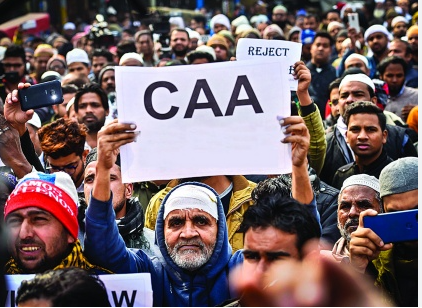The Citizenship Amendment Act (CAA) has been a topic of significant debate and controversy in India since its enactment in 2019. Amidst ongoing discussions about its implementation, a recent revelation from a government helpline has sparked fresh debate – priests are now reportedly authorized to issue CAA eligibility certificates. This development has raised questions about the role of religious authorities in citizenship matters and the potential implications for India’s secular fabric and administrative procedures. In this article, we delve into the details of this announcement, analyze its implications, and explore the broader context surrounding the CAA and citizenship verification processes in India.
Understanding the Citizenship Amendment Act (CAA):–
The Citizenship Amendment Act, passed by the Indian Parliament in December 2019, seeks to grant citizenship to persecuted minorities from Pakistan, Bangladesh, and Afghanistan, specifically Hindus, Sikhs, Buddhists, Jains, Parsis, and Christians, who entered India before December 31, 2014. Critics argue that the CAA discriminates against Muslims and violates the secular principles enshrined in the Indian Constitution.
The CAA sparked widespread protests across India, with opponents expressing concerns about its potential to marginalize Muslim communities and undermine the country’s secular ethos. Additionally, questions were raised about the logistical challenges and administrative complexities associated with implementing the law, particularly regarding the verification of eligibility criteria for citizenship.
Priests Authorized to Issue CAA Eligibility Certificates: Government Helpline Announcement
The recent announcement from a government helpline stating that priests are authorized to issue CAA eligibility certificates has added a new dimension to the ongoing discourse surrounding the controversial law. According to reports, individuals seeking to avail of the provisions of the CAA can now approach priests to obtain certificates attesting to their religious identity and persecution in their country of origin.
This development has raised eyebrows among legal experts, civil society organizations, and religious leaders, who question the rationale behind entrusting religious authorities with the responsibility of issuing citizenship documents. Critics argue that such a move undermines the secular fabric of Indian democracy and sets a dangerous precedent by blurring the lines between religion and state. 
Implications of Allowing Priests to Issue CAA Eligibility Certificates
The decision to authorize priests to issue CAA eligibility certificates carries significant implications for India’s secularism, administrative efficiency, and citizenship verification processes. Some of the key implications include:
- Erosion of Secular Principles: By involving religious authorities in citizenship matters, the government risks eroding the secular foundations of the Indian state and fostering perceptions of favoritism or discrimination based on religious identity.
- Potential for Abuse and Manipulation: Allowing priests to issue CAA eligibility certificates opens the door to potential abuse and manipulation, as individuals may seek to obtain fraudulent documents or misrepresent their religious background to gain citizenship benefits.
- Challenges to Administrative Integrity: Entrusting non-state actors with the authority to issue official documents raises questions about the integrity and reliability of the citizenship verification process, potentially leading to inconsistencies and discrepancies in the documentation.
- Exacerbation of Communal Tensions: The involvement of religious authorities in citizenship matters could exacerbate communal tensions and sow divisions within society, as perceptions of religious bias or preferential treatment may fuel resentment and distrust among different communities.
- Legal and Constitutional Concerns: There are legal and constitutional concerns surrounding the delegation of citizenship verification powers to non-state actors, particularly religious figures, as it may contravene the principles of equality, non-discrimination, and separation of religion and state enshrined in the Indian Constitution.
Broader Context and Challenges of Citizenship Verification in India
The controversy surrounding the authorization of priests to issue CAA eligibility certificates is emblematic of broader challenges facing citizenship verification processes in India. Despite the government’s efforts to streamline citizenship procedures, issues such as documentation requirements, bureaucratic delays, and arbitrary decision-making continue to plague the system.
Furthermore, the politicization of citizenship issues and the conflation of immigration with national identity have complicated efforts to enact comprehensive and inclusive citizenship policies. The CAA, along with other legislative measures such as the National Register of Citizens (NRC) and the National Population Register (NPR), has been mired in controversy and legal challenges, reflecting the complex and contentious nature of citizenship debates in India.
Conclusion
The decision to authorize priests to issue CAA eligibility certificates represents a significant departure from established administrative norms and raises serious questions about the secular principles underpinning India’s democracy. While the government may argue that this move facilitates the implementation of the CAA, critics contend that it undermines the foundational values of equality, secularism, and rule of law.
As India grapples with the challenges of citizenship verification and immigration policy, it is imperative to uphold constitutional principles and ensure transparency, fairness, and inclusivity in the process. Any deviation from these principles risks undermining the integrity of India’s democratic institutions and exacerbating social divisions along religious lines. Therefore, a careful balance must be struck between addressing legitimate concerns about ption and ensuring that citizenship policies adhere to the principles of justice, equality, and secular check the post